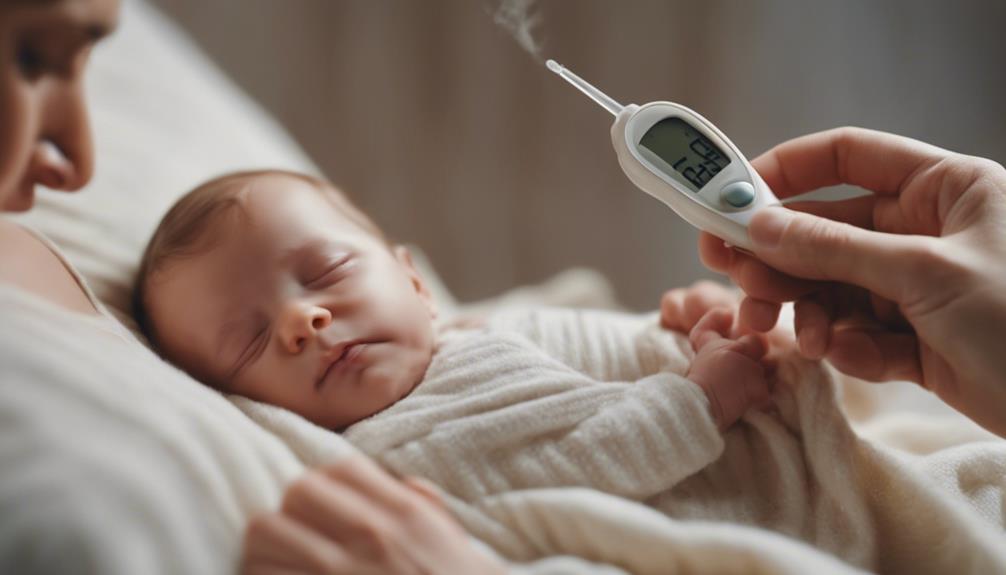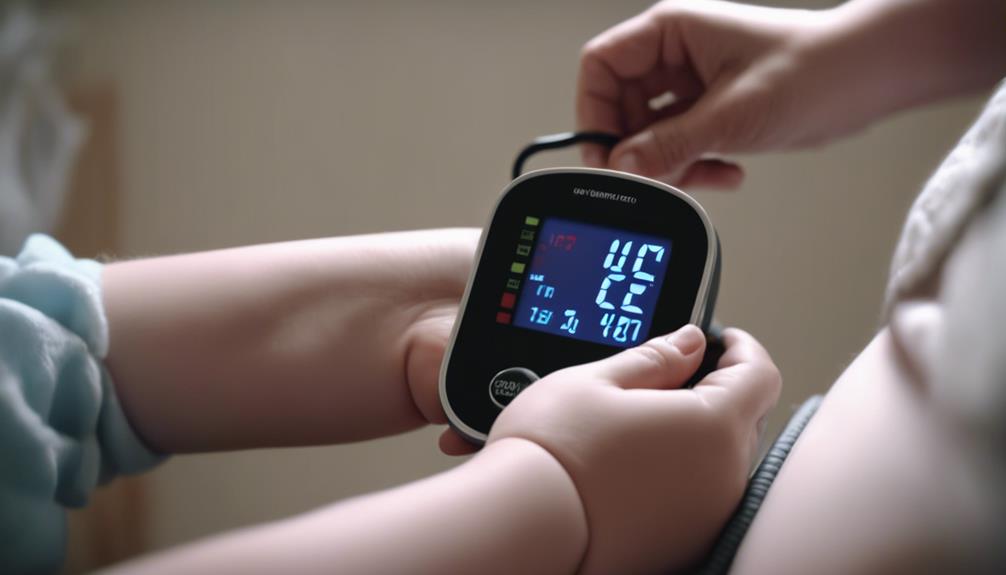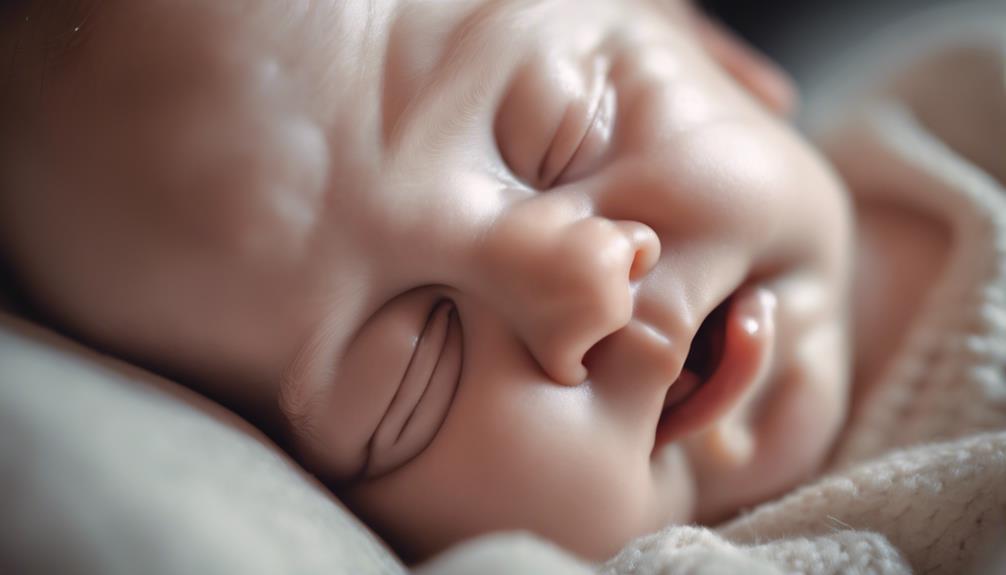Monitoring the body temperature, heart rate, respiratory rate, and blood pressure of your baby is crucial for their well-being. A healthy baby typically has a body temperature around 98.6°F, a heart rate between 70 to 190 beats per minute, and a respiratory rate of 25 to 64 breaths per minute. Keeping a close eye on these vital signs can help detect any potential health issues early on. Remember, ‘critical signs are paramount indicators of an infant’s health.’ By closely observing and understanding these signs, you can ensure the health of your baby. Learning more about each essential sign will enable you to effectively support your baby’s well-being.
Key Takeaways
- Monitor body temperature around 98.6°F with a digital thermometer.
- Check heart rate (70-190 bpm) and respiratory rate (40-60 breaths/min) for normalcy.
- Regularly assess blood pressure; abnormal readings may require medical attention.
- Fever in infants under 3 months warrants immediate medical evaluation.
- Any significant changes in vital signs should prompt contact with a healthcare provider.
Understanding Infant Vital Signs
To understand infant essential signs, you need to know that they include body temperature, heart rate, respiratory rate, and blood pressure. Your child's critical signs are paramount indicators of their health. Normal ranges for these signs in children are essential to monitor your child's well-being.
A child's body temperature typically hovers around 98.6°F, but slight variations can occur. When it comes to your child's heart rate, it usually falls within the range of 70 to 190 beats per minute. Similarly, a child's respiratory rate can vary between 25 to 64 breaths per minute. Blood pressure in children is a bit more complex, depending on factors like age and sex.
High blood pressure and low blood pressure are signs for children that need careful attention and monitoring. Understanding these critical signs is paramount for ensuring your child's health and well-being.
Monitoring Body Temperature

Understanding infant vital signs, particularly body temperature, is essential for monitoring your baby's health and well-being. To accurately measure your baby's body temperature, it's recommended to use a digital thermometer.
For infants under 3 months old, a rectal temperature measurement is the most reliable method. A normal body temperature for a healthy baby typically falls around 98.6°F (37°C). However, it's essential to note that a fever in infants under 3 months is a serious concern that requires immediate medical attention.
Monitoring your baby's body temperature regularly enables parents to detect any potential health concerns early on. By staying vigilant and observing any changes in body temperature, parents can promptly address any issues that may arise.
Assessing Heart Rate

When evaluating your baby's health, monitoring their heart rate is essential for detecting any potential issues early on. The normal heart rate for children varies depending on their age group.
In infants (0-12 months), a normal heart rate ranges from 70 to 190 beats per minute (bpm), while for children aged 1-11 years, it's between 52 to 156 bpm. For children 12 years and older, the normal heart rate is 60 to 110 bpm.
It's important to monitor your child's heart rate regularly to safeguard their health. You can check their heart rate by feeling the pulse and counting the beats per minute. Any signs of illness, such as an unusually slow heart rate, shouldn't be ignored.
Observing Respiratory Rate
Monitoring your baby's respiratory rate is essential for evaluating their overall health and well-being. The normal respiratory rate for a healthy baby typically ranges from 40 to 60 breaths per minute. To determine this, observe your baby's chest rise and fall for a full minute.
Fast or slow respiratory rates can be indicators of breathing difficulties or other health issues. If you notice any significant changes in your baby's respiratory rate, it's important to contact a healthcare provider promptly for further evaluation. Keeping your baby calm and still during this assessment is vital as it helps in obtaining an accurate reading of their respiratory rate.
Abnormal respiratory rates may signal underlying health problems.
Contact a healthcare provider if you observe significant changes in your baby's breathing pattern.
Keeping your baby calm during the assessment guarantees an accurate reading of their respiratory rate.
Checking Blood Pressure

To ensure the overall health of your baby, it's important to understand the significance of checking their blood pressure regularly. Blood pressure in infants differs from that of adults, with normal ranges varying based on factors like age, height, and weight.
High blood pressure in babies can be concerning and might necessitate medical evaluation and monitoring. When measuring blood pressure, two numbers are considered: the systolic (top number) and diastolic (bottom number) values.
Low blood pressure in babies can manifest as symptoms such as poor feeding, lethargy, or breathing difficulties. It's vital to keep a close eye on your baby's blood pressure, especially if there are underlying medical conditions or as advised by healthcare providers.
Frequently Asked Questions
What Are Normal Vital Signs for a Baby?
Your baby's typical life signs include a body temperature of about 98.6°F, a heart rate between 120-160 beats per minute, a respiratory rate of 40-60 breaths per minute, and blood pressure within the appropriate range for their age.
What Are the Guidelines for Pediatric Vital Signs?
Hey, curious about pediatric crucial signs? Remember, for your little one, normal heart rate runs 120-160 beats per minute, breathing should be 40-60 breaths per minute. Blood pressure varies by age, height, and weight. Stay informed!
What Are the 7 Vital Signs?
To safeguard your baby's health, keep in mind the 7 essential signs: body temperature, heart rate, respiratory rate, blood pressure, oxygen saturation, general appearance, and pain level. Regularly monitoring these signs helps you detect any potential issues early on.
What Are Healthy Child Vitals?
Healthy child indicators typically include a body temperature of 98.6°F, a heart rate of 120-160 bpm, a respiratory rate of 40-60 breaths per minute, and a blood pressure of systolic 60-80 and diastolic 30-45. Keep an eye on these!
Conclusion
In summary, monitoring your baby's essential signs is imperative for ensuring their health and well-being.
By regularly checking their body temperature, heart rate, respiratory rate, and blood pressure, you can stay on top of any potential issues and seek medical attention if necessary.
Remember, a healthy baby is a happy baby.
So, keep a close eye on those essential signs and enjoy the peace of mind that comes with knowing your little one is in good health.










